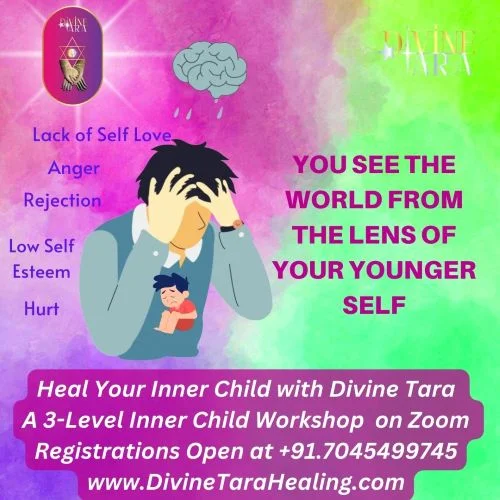INNER CHILD HEALING WORKSHOP
INNER WORK
Meghna Tara
Do you struggle with low self-esteem?
Do you often worry that the people in your life will eventually leave you?
Do you often feel guilty standing up for yourself?
Do you constantly criticize yourself for being inadequate or unworthy?
Do you feel ashamed of expressing strong emotions like anger or sadness?
Do you find it difficult to trust yourself and other people?
Are you an addict or have been addicted to something?
Do you prioritize other people’s needs over your own?
Are you scared to express yourself or give your opinion in front of everyone?
WHAT IS INNER CHILD WOUNDING?
Inner Child is the child within us who didn’t get his/her emotional needs met. We all have a younger part of ourselves that was “never quite loved the way we needed to be loved” Your childhood is not a separate part of your life. The experiences you had as a child affect your life even today. However, many people are unaware of this connection and end up struggling with physical, emotional and mental problems
Inner work is the act of going deep within ourselves, to reconnect with the forgotten, rejected and painful emotions that we bury very deep in the subconscious. We carry wounds from emotional neglect to physical abuse.
When these deep hurts are not addressed they are brushed under the carpet and ignored, and one moves on in their lives projecting to the world as strong independent people. We may learn to suppress or ignore our emotional needs as a way of coping.
This kind of living transforms into behaviours destructive to ourselves and our environment. We betray ourselves by developing patterns of workaholism, alcoholism, codependency, people pleasing behaviours, looking for constant approval from the outside world, lack of confidence, lack of self worth, self sabotaging, self sacrificing yourself for others.
This leads us to a feeling of being disconnected or lost as we grow older. We are not in control of our life as we navigate directionless in this world, following and doing what the world dictates to us.
By healing our inner child, we begin to create the safety and security our younger selves have always needed. We shine in the world by tapping into our gifts.
“When we heal the inner child, we heal generational patterns as we become very conscious of the damage unhealed emotional wounds can do.”
There are a few broad issues that dominate our world view, and the way we look at ourselves. These are identified as several categories, Meghna will be covering each wound and she will take you through the deep-rooted wounds from your childhood and teenage years, reinvigorating the very essence of your being.
LEVEL 1
Day 1
REJECTION WOUND
-
Root cause of this wound is Shame.
-
A feeling unworthy of love.
-
Feeling rejected by parents, loved ones, society, friends, or past lovers can create internalized shame.
GUILT WOUND
-
Feels “sorry” or “bad”
-
Doesn’t like to ask for things
-
Uses guilt to manipulate
-
Is afraid to set boundaries
-
Normally attracts people who make them feel guilty
Day 2
TRUST WOUND
-
Doesn’t trust themselves
-
Finds ways not to trust people
-
Feels insecure and needs lots of external validation
-
Doesn’t feel safe
-
Normally attracts people who don’t feel safe
ABANDONMENT WOUND
-
Feels “left out”
-
Is afraid of being abandoned
-
Hates being alone
-
is codependent
-
Threatens to leave
-
Normally attracts emotionally unavailable people
Day 3
NEGLECT WOUND
-
Finds it difficult to let things go
-
Has low self-worth
-
Gets angry easily
-
Can’t say no
-
Suppressed emotions
-
Avoids being vulnerable
-
Normally attracts people who don’t appreciate them or make them feel seen.
TEENAGE INNER WOUNDS -
Inner teenager healing acknowledges the early inner child wounds that were unprocessed in the early environments.
-
Unexpressed anger
-
Not feeling safe to speak your truth.
-
Emotionally reactive from the pain that they’ve been feeling for so long, especially around family
-
Rebellious spirit, may engage in self-sabotaging behaviours.
-
Overspending, procrastination, emotional eating, addictions, and tends to seek romantic partners that aren’t a good fit.
LEVEL-2
DAY 1
FATHER WOUNDS
Childhood is a very impressionable period, this is where the child forms perceptions not only about the world, but also about themselves. Any dysfunctionality, toxicity or normalness is always internalized by the child as the ‘absolute’. Children tend to internalize their parents’ behavior as their fault.
-
Father wound is a consequence of a person’s father being physically absent, emotionally distant or abusive, negative or overly critical.
-
A father-wound can instill feelings of not meeting expectations.
-
Not being good enough and being undeserving of love.
-
Low self-esteem can result in an individual:
-
Never pushing themselves in school or work
-
Difficulty in connecting with others
-
More susceptible to substance abuse
-
A father wound can leave a person feeling low, depressed or anxious about their parental relationship.
DAY 2
MOTHER WOUNDS
The Mother Wound is passed through generations of women in patriarchal cultures and how your mother’s unprocessed trauma impacted you.
-
Not feeling good enough
-
Shame
-
Feeling you must remain small in order to be loved.
-
A persistent sense of guilt for wanting more than you currently have.
-
Not being your authentic self because you don’t want to threaten others.
-
Having a high tolerance for poor treatment from others.
-
Feeling competitive with other women.
-
Self-sabotaging behaviours.
-
Being overly rigid and dominating.
-
May lead to eating disorders, depression and addictions.
LEVEL 3
DAY 1
ATTACHMENT STYLES
“Communication is key to any and every relationship missing which creates unnecessary chaos and overthinking in the mind. These stem from inner child traumas. It is important to understand the ‘whys’ of every behaviour. Self observation and awareness is important as we keep healing aspects of ourselves along the way”
~ Meghna
Attachment styles describe the ways we connect and communicate with our loved ones. This is most often an unconscious choice.
ANXIOUS ATTACHMENT
Do you feel the constant need to reach out to your loved ones or significant others for reassurance or affection, even if it disrespects your own boundaries? Maybe your attachment style is Anxious.
-
Neglectful or inconsistent parenting could make the child believe they would be abandoned and feel they have to put in ‘the work’ to make any relationship work.
-
Feel a need for constant validation or have low self-esteem.
-
Feel anxious, threatened or worried if their partner wants space, or tries to set a physical boundary.
-
Constantly ‘give’ to others in order to feel significant.
-
Might be preoccupied with the thoughts of being abandoned by their partner.
-
Feel responsible for the emotional well-being of others
-
They might be people-pleasers too
AVOIDANT ATTACHMENT
Individuals with Avoidant or Dismissive attachment style might be very social, professionally successful but tend to avoid real intimacy or closeness in their relationships. They might believe that they don’t need emotional closeness with anyone in life.
-
Such individuals were made to feel ‘not provided for’ whenever they sought emotional help from their caregivers, during their childhood.
-
They often conclude that people cannot be relied upon and hence, they simply stop seeking or expecting any kind of closeness from others. It’s a decision they unconsciously made as children.
-
Even though you might be an outgoing person, they tend to avoid apparent displays of emotions.
-
If a relationship demands more of them, they close themselves to any kind of emotional intimacy or commitments.
-
Irrespective of how confident or successful these individuals are in their professional or social life, they might be the core reason for their own dysfunctional relationships.
DAY 2
ANXIOUS – AVOIDANT ATTACHMENT
Individuals with an Anxious-Avoidant Attachment style may feel the urge to have emotionally close relationships, but become distant and anxious when a progression occurs. They might ‘back off’ when their partner or a loved one tries to get closer than their comfort zone.
-
When the child expresses a desire for emotional closeness, instead of receiving it, they are made to feel a ‘door shut on the face’ treatment by their caregivers. Any strong emotions such as joy, excitement, sadness or fear is disregarded.
-
Caregivers whose children become avoidant might avoid expressing their own feelings and can become angry and try to disrupt the child’s behavior by telling the child to toughen up and expect the child to behave independent and mature.
-
Such individuals may take a step back when more is asked of them in a relationship, instilling anxiety, distress, or distance.
-
They might feel overwhelmed by their partner’s attempt for affection causing them to partially or completely avoid commitment.
-
Even though they crave love, they have a tendency to show avoidance behavior.
-
They might feel that they will never be able to find a significant other, and hence prefer being alone and channelize all their energy towards other goals/pursuits.
SECURE ATTACHMENT
An individual with a secure attachment style may exactly know how to navigate their own feelings as well as be present for their significant others. Their own emotional regulation is at par with their emotional experiences. Such individuals are in awareness of their choices and behaviours with others.
-
Caregivers of such individuals are responsive and attuned to the needs of their children.
-
The emotional regulation of these children has been stable and rock solid, leading them to understanding their own emotions. Such a stable framework and parenting leads to building a secure attachment style.
-
Feeling emotionally close to others
-
Being aware of how and when to set boundaries
-
Accepting the boundaries of others
-
Moving on from relationships that no longer serve them
-
Having open and direct conversations about conflicts
-
Making their own choices and having a healthy level of independence
-
Detecting red flags in the behavior of potential partners or friends
-
Knowing when to let go
KINDLY NOTE: There will be one personal healing session for each participant with Meghna, this is included for Clearance of your traumas/healing of your inner child along with the group sessions
Level |
Dates |
Level 1 |
December 15th, 16th, 17th, 2023 |
Level 2 |
January 6th, 7th, 2024 |
Level 3 |
January 13th, 14th, 2024 |
All 3 Levels |
Package Fees – USD 1225 |
All 3 Levels |
Package Discount Early Bird Ends on 13th December, 2023 |
All 3 Levels |
Package Discount for Library Members |



